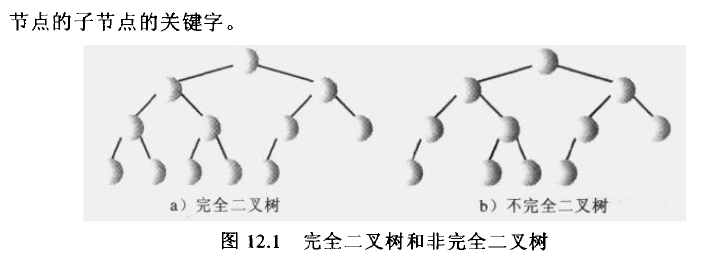1
2
3
4
5
6
7
8
9
10
11
12
13
14
15
16
17
18
19
20
21
22
23
24
25
26
27
28
29
30
31
32
33
34
35
36
37
38
39
40
41
42
43
44
45
46
47
48
49
50
51
52
53
54
55
56
57
58
59
60
61
62
63
64
65
66
67
68
69
70
71
72
73
74
75
76
77
78
79
80
81
82
83
84
85
86
87
88
89
90
91
92
93
94
95
96
97
98
99
100
101
102
103
104
105
106
107
108
109
110
111
112
113
114
115
116
117
118
119
120
121
122
123
124
125
126
127
128
129
130
131
132
133
134
135
136
137
138
139
140
141
142
143
144
145
146
147
148
149
150
| class Node_Heap{
public int iData;
public Node_Heap(int iData) { //构造函数
super();
this.iData = iData;
}
public int getiData() {
return iData;
}
public void setiData(int iData) {
this.iData = iData;
}
}
class Heap{
private Node_Heap[] heapArray;
public int maxSize;
private int currentSize;
public Heap(int maxSize) { //构造函数
super();
this.maxSize = maxSize;
this.currentSize = 0;
heapArray = new Node_Heap[maxSize];
}
public boolean isEmpty(){
return currentSize ==0;
}
public boolean insert(int key){
if(currentSize == maxSize){
return false;
}
Node_Heap newNode = new Node_Heap(key);
heapArray[currentSize] = newNode; //把插入的节点放在最后的位置
trickleUp(currentSize++); //插入节点并把currentSize加1
return true;
}
//用于插入,把父类节点下移,然后把插入的节点放到合适的位置
public void trickleUp(int index){
int parent = (index-1)/2;
Node_Heap bottom = heapArray[index]; //暂存新插入的节点,因为需要把父节点下移
while(index>0 && heapArray[parent].getiData()<bottom.getiData()){ //如果小,就下移
heapArray[index] = heapArray[parent]; //把父类节点下移
index = parent; //用于递归
parent = (parent-1)/2;
}
heapArray[index] = bottom; //把插入的节点放到合适的位置
}
public Node_Heap remove(){ //删除最大的节点
Node_Heap root = heapArray[0];
heapArray[0]=heapArray[--currentSize];
trickleDown(0);
return root;
}
//用于删除,把子类节点上移
public void trickleDown(int index){
int largerChild;
Node_Heap top = heapArray[index]; //
while(index<currentSize/2){ //如果小,就下移
int leftChild = 2*index+1;
int rightChild = leftChild+1;
if(rightChild<currentSize && heapArray[leftChild].getiData() < heapArray[rightChild].getiData())
largerChild = rightChild;
else
largerChild = leftChild;
if(top.getiData()>=heapArray[largerChild].getiData())
break;
heapArray[index] = heapArray[largerChild];
index = largerChild;
}
heapArray[index] = top;
}
public void displayHeap(){
System.out.print("heapArray:");
for(int i=0;i<heapArray.length;i++){
if(heapArray[i] != null)
System.out.print(heapArray[i].getiData()+" ");
else
System.out.print(" -- ");
}
System.out.println();
int nBlanks = 32; //定义空格
int itemsPerRow = 1;
int column = 0;
int j=0; //标记当前的数组下标,从0开始
System.out.println("......................................................");
while(currentSize > 0){
if(column == 0){
for(int i=0;i<nBlanks;i++){
System.out.print(" ");
}
}
System.out.print(heapArray[j].getiData());
if(++j == currentSize){
break;
}
if(++column==itemsPerRow){ //如果每一行计数等于这一行的上限,则换行
nBlanks /= 2; //空格数减半
itemsPerRow *= 2; //每一行的上限
column = 0;
System.out.println();
}else{
for(int i=0;i<nBlanks*2-2;i++){
System.out.print(" ");
}
}
}
System.out.println("\n"+"......................................................");
}
}
public class Heap_demo {
public static void main(String[] args) {
// TODO 自动生成的方法存根
int anArrays[]={1,2,3,4,5,6,7,8,9,10};
Heap theHeap = new Heap(31);
// theHeap.insert(1);
// theHeap.insert(2);
// theHeap.insert(3);
// theHeap.insert(4);
// theHeap.insert(5);
// theHeap.insert(6);
for(int i=0;i<10;i++){
theHeap.insert(anArrays[i]);
}
theHeap.displayHeap();
//theHeap.remove();
//theHeap.displayHeap();
for(int i=0;i<10;i++){
anArrays[i]=theHeap.remove().iData;
}
for(int i=0;i<10;i++){
System.out.print(anArrays[i]+" ");
}
}
}
|









